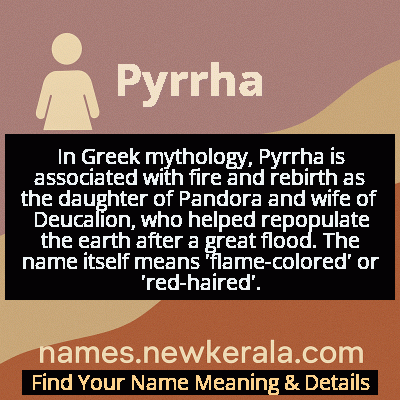Pyrrha Name Meaning & Details
Origin, Popularity, Numerology Analysis & Name Meaning of Pyrrha
Discover the origin, meaning, and cultural significance of the name PYRRHA. Delve into its historical roots and explore the lasting impact it has had on communities and traditions.
Name
Pyrrha
Gender
Female
Origin
Greek
Lucky Number
5
Meaning of the Name - Pyrrha
In Greek mythology, Pyrrha is associated with fire and rebirth as the daughter of Pandora and wife of Deucalion, who helped repopulate the earth after a great flood. The name itself means 'flame-colored' or 'red-haired'.
Pyrrha - Complete Numerology Analysis
Your Numerology Number
Based on Pythagorean Numerology System
Ruling Planet
Mercury
Positive Nature
Adventurous, dynamic, curious, and social.
Negative Traits
Restless, impatient, inconsistent, prone to indulgence.
Lucky Colours
Green, white.
Lucky Days
Wednesday.
Lucky Stones
Emerald.
Harmony Numbers
1, 3, 9.
Best Suited Professions
Sales, marketing, travel, entertainment.
What People Like About You
Versatility, charisma, adventurous spirit.
Famous People Named Pyrrha
Pyrrha of Thessaly
Mythological Figure
Survived the Great Flood and repopulated earth with Deucalion
Pyrrha (Literary Character)
Literary Figure
Central figure in Ovid's flood narrative in Metamorphoses
Pyrrha Nikos
Fictional Character
Beloved warrior and mentor in RWBY animated series
Name Variations & International Equivalents
Click on blue names to explore their detailed meanings. Gray names with will be available soon.
Cultural & Historical Significance
The mythological narrative establishes Pyrrha as a matriarchal figure equivalent to Eve in Abrahamic traditions—the mother of a renewed human race. When she and Deucalion throw stones over their shoulders, these stones transform into humans, with Pyrrha's stones becoming women and Deucalion's becoming men. This creation story reflects ancient Greek understanding of gender roles and the complementary nature of the sexes. The name's connection to fire color (pyrrhos) further enriches its symbolism, linking destruction (the flood) with the creative fire of new life and civilization.
Extended Personality Analysis
The name Pyrrha evokes a personality marked by extraordinary resilience and transformative strength. Individuals with this name often demonstrate an innate ability to survive and thrive through adversity, much like their mythological namesake who weathered the ultimate catastrophe. They typically possess a calm wisdom that enables them to make clear-headed decisions even in chaotic situations. Their thinking tends to be both practical and visionary—able to address immediate needs while planning for long-term regeneration.
Pyrrhas often exhibit a nurturing yet strong-willed character, combining maternal instincts with leadership qualities. They're frequently drawn to roles that involve rebuilding, teaching, or guiding others through transitions. The fiery etymology suggests passionate engagement with life and a warmth that draws people to them, yet also indicates a potential for intense emotions and strong convictions. Their personality often includes a deep sense of responsibility toward community and future generations, reflecting their mythological role in ensuring humanity's continuation. They tend to be bridge-builders who can connect disparate groups and facilitate healing and renewal in relationships and communities.
Modern Usage & Popularity
In contemporary naming practices, Pyrrha occupies a unique niche as a classical name that remains distinctive without being completely unfamiliar. While it has never reached mainstream popularity, it has maintained a steady presence among parents seeking names with strong mythological roots and powerful feminine energy. The name saw a notable increase in recognition following the introduction of Pyrrha Nikos in the RWBY animated series (2013-2016), which introduced the name to a new generation. Current usage trends show Pyrrha being chosen primarily by parents with interests in classical literature, mythology, or those seeking gender-strong names for daughters. It's particularly popular in academic communities and among families of Greek descent. The name's rarity (appearing outside the top 5000 names in most English-speaking countries) makes it appealing to parents wanting a unique name, while its classical pedigree ensures it doesn't sound invented or trendy. Modern Pyrrhas often go by nicknames like 'Py' or 'Rra' in casual settings.
Symbolic & Spiritual Meanings
Pyrrha carries profound symbolic weight as an emblem of cosmic renewal and human resilience. Her story represents the ultimate metaphor for rebirth after catastrophe—the idea that from complete destruction can emerge new life and civilization. The stones she casts behind her that transform into humans symbolize the latent potential within seemingly inert matter, reflecting ancient beliefs about the animating spirit within all creation. This transformation myth speaks to the human capacity to create meaning and community even when starting from nothing.
The flame-colored etymology adds layers of symbolic meaning, connecting her to both destructive and creative fire. Fire destroys but also purifies, transforms, and provides warmth and light—much like Pyrrha's role in mythology. She symbolizes the paradox of destruction as a necessary precursor to creation, and the idea that true renewal often requires complete transformation rather than mere repair. Her narrative serves as an enduring symbol of hope, demonstrating that human civilization and compassion can survive even the most devastating circumstances when guided by wisdom and cooperation.

